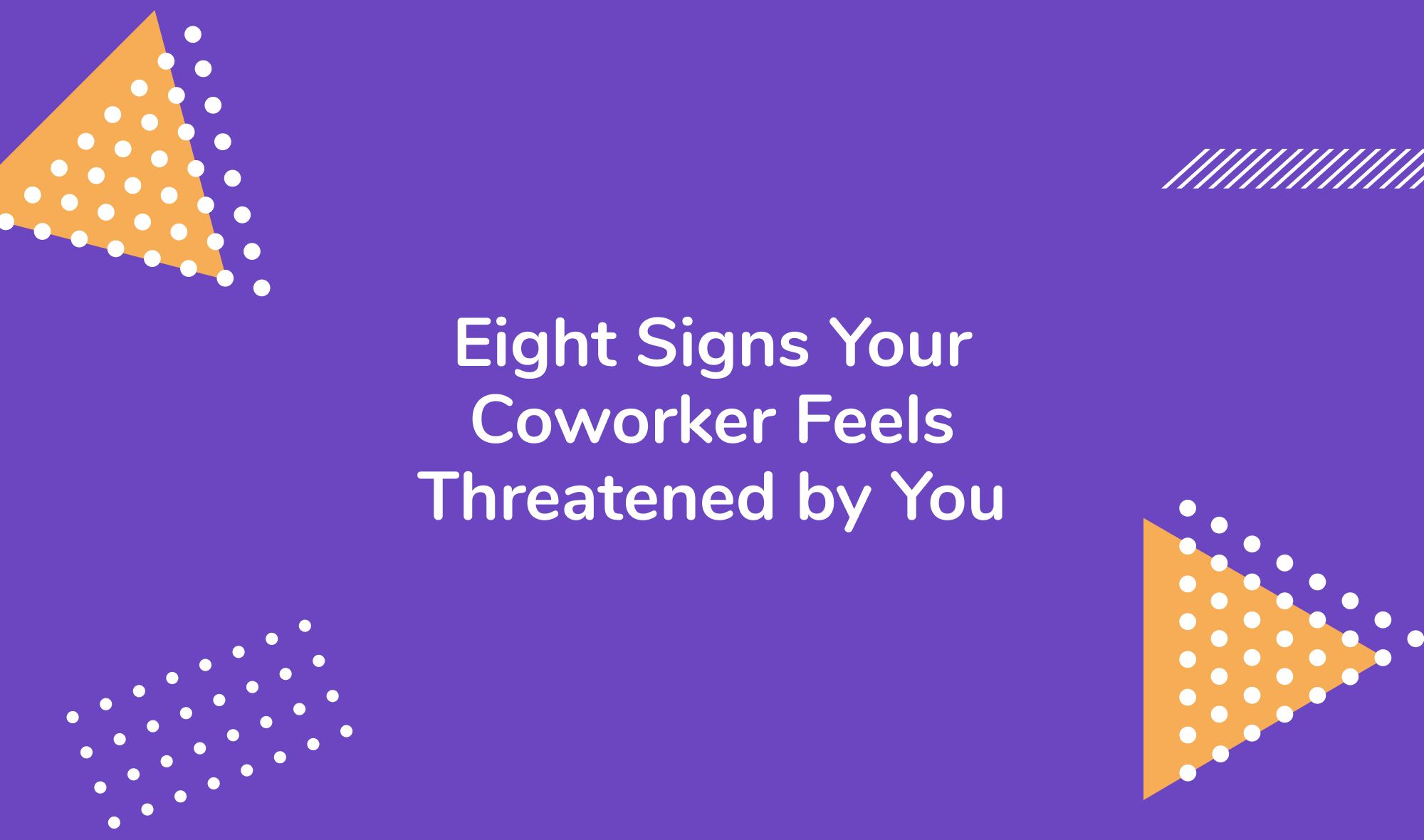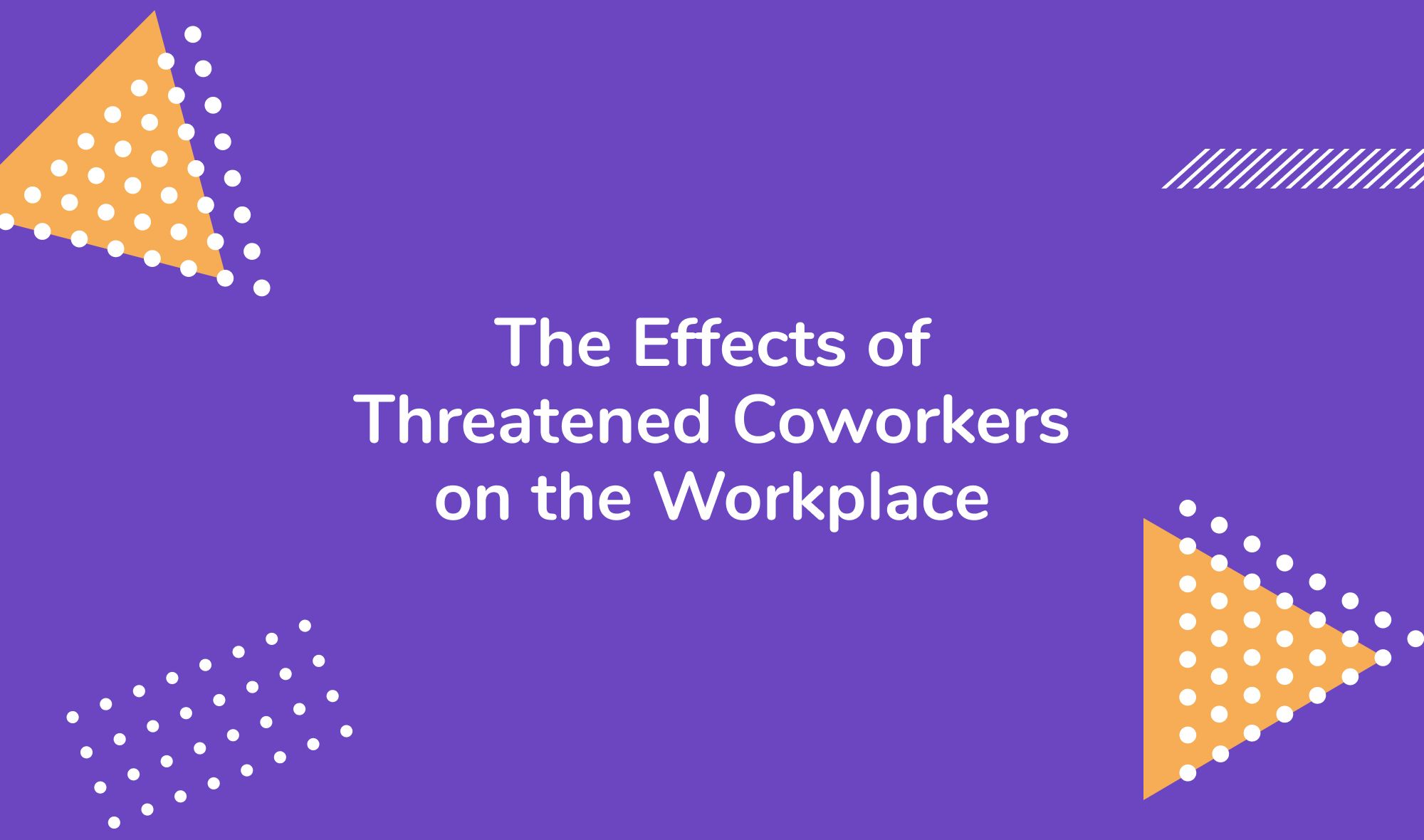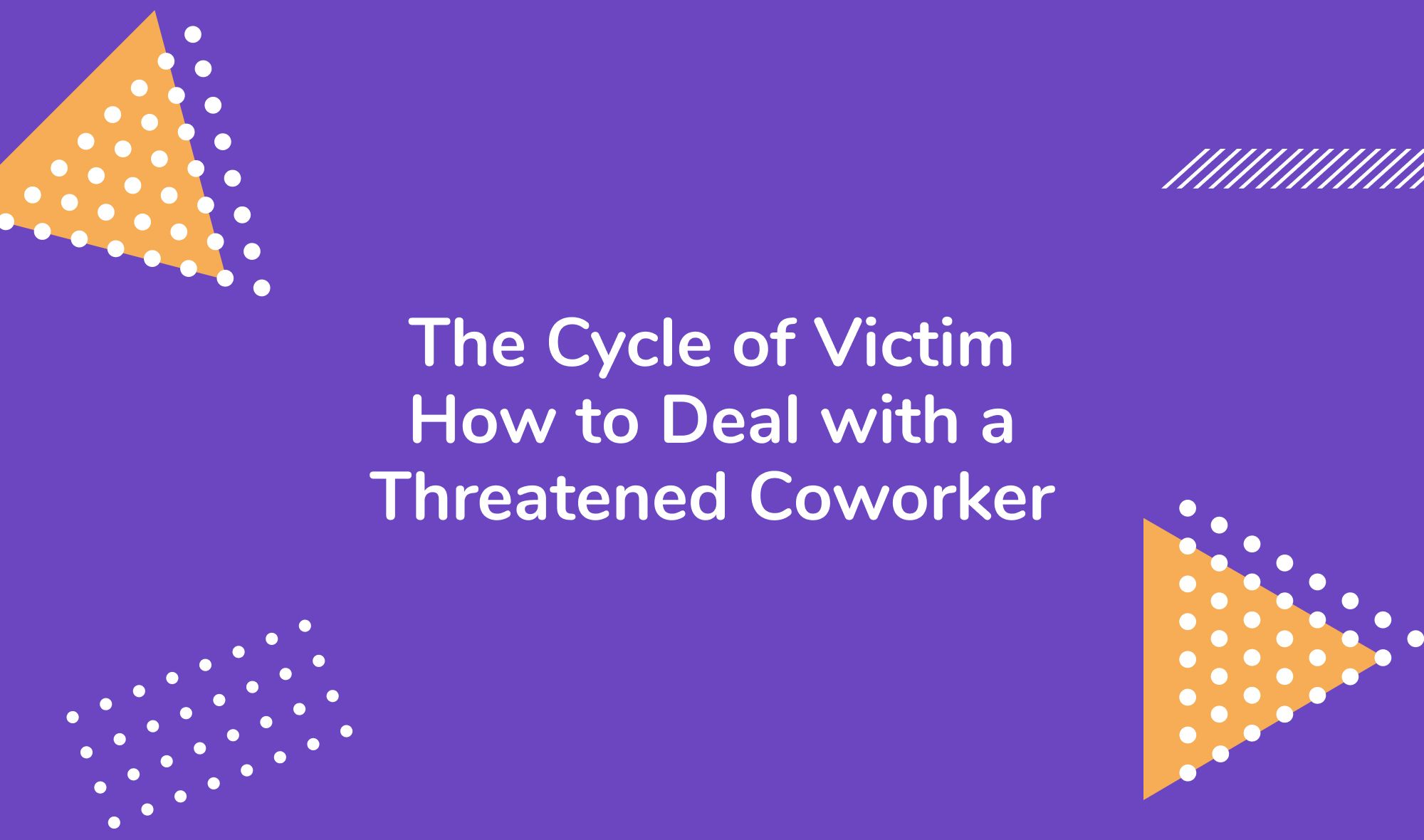8 Signs Your Coworker Is Threatened by You And What To Do
By Julian Lewis • July 19, 2023
Key Takeaways
- It's important to recognize the signs of a threatened coworker such as unhealthy competition, negative attitudes, excessive criticism, and attempts at sabotage.
- The presence of a threatened coworker can negatively impact the workplace environment and individual's professional growth.
- Addressing this issue requires strategic action and may include seeking professional help, such as coaching or mediation, when necessary.
- Your mental well-being and career progression should always be a priority, and there are resources available to support you in dealing with such challenges.

Have you ever noticed a strange coworker's behavior? Maybe they're overly competitive, or perhaps their demeanor towards you has shifted for no apparent reason. If you've been feeling uneasy, avoiding eye contact, you may be dealing with a jealous coworker threatened by your performance and presence in the workplace.
Workplace jealousy can transform a previously harmonious environment into a hotbed of contention and rivalry. It's important to recognize the signs that a coworker is threatened and learn how to handle this delicate situation professionally without jeopardizing your professional progress.
In this comprehensive guide, we'll help you navigate the tricky terrain of office politics, understand what it means a coworker may feel insecure around you, identify the subtle way that indicates a jealous coworker, and offer practical strategies on how to deal with this complex issue.
Stay with us as we delve deeper into understanding the dynamics of workplace rivalry, its potential effects on your career, and how you can manage it effectively. As part of our discussion, we will also share useful resources, including expert books and enlightening blog posts that offer further insights into this topic.
Ready to take the first step towards maintaining a healthier and more productive workplace environment? Let's get started.
Join our Newsletter
Transform your career with our personal growth insights. Get one valuable tip right in your inbox every Saturday morning.
What Does It Mean When a Coworker is Threatened by You?
The workplace can often be a competitive environment, but not everyone will strive to make their mark and advance their careers. Sometimes, this competitive spirit can foster an atmosphere of professional rivalry, especially if a coworker perceives you as a threat to their own success or position. But what does it actually mean when a coworker is threatened by you?
When a peer or associate may feel insecure or uneasy about your achievements, skills, or status within the organization, they might feel threatened. This sense of threat often stems from their own feelings of inadequacy or fear that they might lose out on promotions, recognition, or other career advancements. These emotions may lead to behaviors that create tension in the workplace which can be identified through defensive body language, and this disrupts not only your working relationship with the colleague in question but also the overall office harmony or in any social events.
These colleagues might see you not just as one coworker, but as a competitor who stands in the way of their own success. They may resort to various tactics to protect their position or to belittle your achievements, leading to a complex dynamic that can be hard to navigate. Recognizing these common signs early through eye contact or some other things and understanding how to address them can help to mitigate any negative emotions that may impact your work environment.
For those that feel insecure or threatened, we have compiled some useful strategies in our blog post on how to stop being jealous. This advice can help foster a healthier working relationship with your other coworkers and mitigate feelings of jealousy.
For a more detailed understanding of these interpersonal dynamics, Thomas Erikson's book "Surrounded by Idiots" offers insightful explanations on how different personality types interact, which can be particularly useful in managing such scenarios.
Additionally, understanding generational differences can also be crucial in dealing with workplace jealousy and competition. Younger coworkers may express their insecurities differently than their older counterparts. For more insights on this, check out our blog post on "Working with Millennials" to better comprehend defensive body language and navigate these generational dynamics.
The better you understand the complexities of workplace dynamics, the better equipped you'll be to handle such situations. The next section will help you identify the common signs that one coworker is threatened by you.
Eight Signs Your Coworker Feels Threatened by You

Navigating workplace dynamics requires a keen understanding of the signs that indicate a coworker may feel threatened by you. Recognizing these signs early can help you manage the situation and prevent a toxic environment. Here are eight key indicators to watch out for:
1. Unhealthy Competition
A little bit of competition in the workplace can be a good thing, but when it becomes incessant and takes a turn based on negative body language and other observations, it could be a sign that one coworker feel threatened. They may constantly try to outdo you or take credit for your good work.
2. Negative Attitude Towards Your Achievements
If your coworker reacts negatively or seems dismissive when you achieve something, it may indicate insecurity. This could be a lack of enthusiasm about your promotions or belittling your accomplishments. For more on the subject of career progress and how to handle it, read our post on "Promotion in the Workplace".
3. Excessive Criticism or Undermining Your Performance
It's healthy for the receiving end to get constructive criticism at work, but if your coworker is persistently critical of your work, even when it's unwarranted, they might be trying to undermine your performance. Read more about maintaining your performance in spite of constant criticism in our blog post: "Proper Preparation Prevents Poor Performance".
Join our Newsletter
Transform your career with our personal growth insights. Get one valuable tip right in your inbox every Saturday morning.
4. Gossip and Backstabbing
Gossiping and backstabbing are classic signs of a coworker may be threatened and jealous. They may spread false rumors or negative emotions and comments about you behind your back to tarnish your reputation in the workplace.
5. Exclusion From Important Projects or Conversations
If you find yourself consistently being left out of essential projects or discussions, maybe your coworker is threatened by you and trying to limit your visibility and involvement.
6. Attempts to Sabotage Your Work or Reputation
Sabotage can take many forms - from misplaced reports to deliberately given misinformation. If your coworker attempts to undermine your work, take credit or discredit you through, it's a clear sign of threat.
7. Unwarranted Challenges to Your Ideas or Contributions
Your ideas and suggestions being continually challenged or dismissed without reason can also be an indication that your coworker feel threatened. For more on how to manage these dynamics, check out our post on the "Individual Contributor vs Manager".
8. Displays of Jealousy or Resentment
Sometimes, a coworker's behavior and feelings of threat can manifest as jealousy or resentment. You might notice them with their negative body language that shows them becoming upset or uncomfortable when you receive praise or recognition.
Recognizing these signs can be the first step in addressing and diffusing a potentially toxic situation professionally. Next, we will look at practical strategies on how to deal with a coworker who feel threatened by you.
The Effects of Threatened Coworkers on the Workplace

Workplace dynamics significantly influence the professional environment, playing a crucial role in individual career progress and the overall health of the organization. A coworker might feel threatened by you, it can lead to disruptive and negative consequences, affecting not just your career trajectory but the broader professional atmosphere.
One of the immediate impacts can be the creation of a tense and uncomfortable environment. The constant criticism, undermining, or unwarranted challenges can instigate discord among teammates, stifle creativity, and breed hostility. This can hinder collaboration, damaging the team's ability to innovate and perform optimally.
Moreover, such a situation may lead to increased stress levels for you and other colleagues, impacting your mental state and overall job satisfaction. It may also affect your career progression, as constant negativity and roadblocks can hamper your ability to showcase your skills and accomplishments effectively.
Threatened other coworkers can also compromise the values of the organization, as unethical actions like sabotage or gossip can undermine trust and cooperation—core principles of a healthy professional environment. Over time, this can potentially affect the company's morale, reputation, and productivity.
For more insights on dealing with challenging work dynamics, the book "Becoming Bulletproof" offers helpful strategies on how to navigate difficult situations fearlessly and efficiently.
Additionally, establishing a safe and positive environment is crucial in preventing and managing such situations. You can read more about this in our post on "Psychological Safety at Work", where we delve deeper into building an environment that fosters trust, openness, and productive collaborations.
How to Deal with a Threatened Coworker

Handling a coworker might be threatened by you can be a challenging task. It requires careful attention to your own behavior, a strong understanding of your professional relationships, and a strategy to cope with the situation. Here are some methods to manage such a scenario effectively:
- Maintain Professionalism: Regardless of the circumstance, always keep your behavior professional. Responding to negativity with negativity only escalates the situation. Focus on your work and deliverables, and maintain your performance and productivity.
- Open Communication: If you feel comfortable, communicate with the individual about the issue. Avoid confrontational language. Instead, use 'I' statements (e.g., "I feel...", "I noticed...") to express your concerns about their actions and the effect on your work.
- Document Incidents: Keep track of instances where you feel undermined or sabotaged. This documentation can provide evidence if you need to report the situation to your supervisor or human resources.
- Seek Guidance: Don’t hesitate to seek advice from a mentor, coach, or a trusted senior colleague. They can provide insights based on their experiences and help you navigate the situation.
- Build a Support Network: Foster positive relationships with your other coworkers. A strong support network can counterbalance the negativity and also provide you with allies who can vouch for your work. Moreover, your executive presence can play a crucial role in shaping your reputation and your ability to effectively counter negativity in the workplace.
- Self-Care: Don’t let this situation affect your mental state. Practice self-care routines, engage in activities that help you de-stress, and consider seeking support from a mental professional if needed.
Remember, every situation and individual is unique, and there may not be a one-size-fits-all solution. Be patient with yourself and try to take time to assess what strategies work best for you. For further insights and strategies on professional growth, check out our post on "Coaching vs Mentoring".
To maintain mental well-being, consider incorporating these mental illness healthy habits into your daily routine.
When to Seek Professional Help

There are times when despite your best efforts, dealing with a threatened coworker might seem like an uphill task. Their behavior may continue to impact your work, create a hostile environment, or worse, escalate into a more serious situation. It's crucial to know when to seek professional help, such as business coaching, personal coaching, or mediation. Here's when you might want to consider it:
- Persistent Issues: If your coworker's behavior persists negatively despite your efforts to address the situation directly or indirectly, it might be time to get professional assistance.
- Increased Stress Levels: When the situation starts affecting your mental health, leading to increased stress levels, anxiety, or depression, professional help should be sought immediately.
- Adverse Impact on Performance: If the coworker's actions are seriously hampering your great work performance and career progression, professional intervention can help address and resolve the issue.
- Escalation: If the behavior escalates to personal attacks, bullying, or any form of harassment, it's crucial to immediately seek help from a professional or the relevant authority within your organization.
If you're interested in learning more about managing workplace anxiety, check out our comprehensive guide on Understanding how to calm anxiety at work.
Working with Difficult People is an excellent resource for more insights on handling challenging colleagues. The book provides strategies and advice on effectively dealing with different types of difficult most people in a professional setting.
If you find yourself in such a situation, remember that you're not alone. Professional help such as business coaching or personal coaching can provide you with valuable tools and strategies to navigate through these challenges, fostering a more positive workplace environment.
Conclusion
In conclusion, recognizing the most common signs of a threatened colleague may help you better understand the dynamics at play within your workplace. From unhealthy competition, sabotage attempts, to unwarranted challenges, these signs are indicative of deeper issues rooted in professional jealousy and insecurity.
Managing these situations requires patience, understanding, and strategic actions. Always strive to maintain a professional demeanor, focus on building a healthy working relationship, and continue to excel in your performance, regardless of the challenges you face shows people a lot.
But remember, you don't have to face these issues alone. Whether it's seeking support from your superiors, peers, or even professional services like business coaching or personal coaching, know that there are resources available to you.
Importantly, if the situation escalates or is adversely affecting your mental well-being, career progression, or overall job satisfaction, don't hesitate to seek professional help. Remember, your well-being and professional growth are priorities.
And for those who may be inadvertently engaging in self-sabotaging behavior due to the actions of a coworker, know that there is help available. Our post on self-sabotaging behavior provides some valuable insights on how to identify and address these behaviors.
While the workplace can be a platform for competition, it shouldn't be a place of fear or hostility. With the right mindset, tools, and support, you can successfully navigate through these challenges, turning them into opportunities for growth and improved interpersonal skills.
Remember, every challenge is a stepping stone towards a better you. Stay strong, stay focused, and keep growing.
If you're looking a few ways to foster a positive working relationship with your other coworkers, check out our blog post on 100 Ways to Express Gratitude.
Read more about: Professional Development, Self Advocacy, Employee Experience, Executive Coaching
About Julian Lewis
Julian Lewis is a driven and accomplished professional with a passion for driving positive change in the business world. He is the co-founder and COO at Zella Life.
His own experience as a professional of color in a Fortune 500 company led him to discover the limitations for advancement that many professionals like himself face. Determined to reach his full potential, Julian became an established business coach and entrepreneur, committed to supporting others in their pursuit of personal and professional growth.
Today, Julian is a recognized corporate trainer, coach, and leader, known for his ability to leverage real-life experiences and evidence-based methodologies to affect positive change within individuals and organizations. As the leader of Zella Life's coaching division, he is dedicated to empowering individuals and businesses to achieve their full potential.